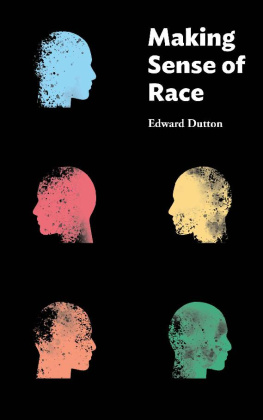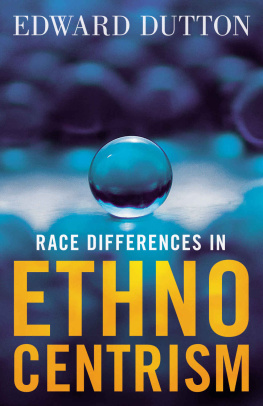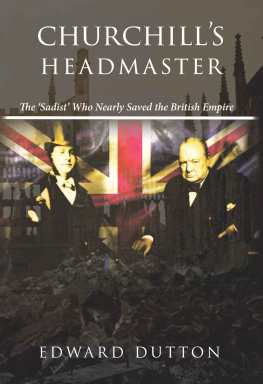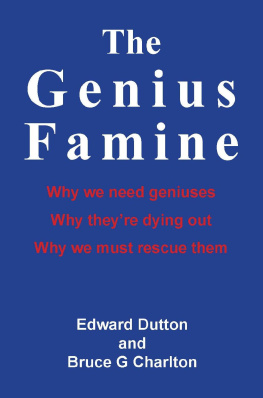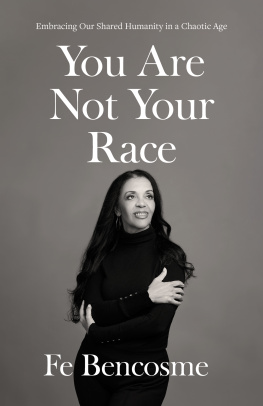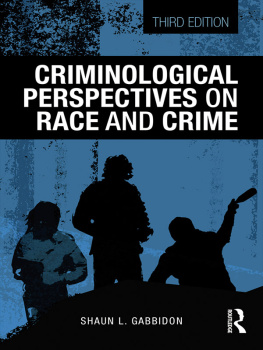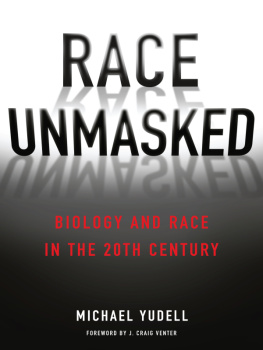Making Sense of Race
Edward Dutton
2020 by Edward Dutton
All rights reserved.
No part of this publication may be reproduced, distributed, or transmitted in any form or by any means, including photocopying, recording, or other electronic or mechanical methods, or by any information storage and retrieval system, without prior written permission from the publisher, except for brief quotations embodied in critical reviews and certain other non-commercial uses permitted by copyright law. For permission requests, contact the publisher.
Washington Summit Publishers
P.O. Box 1676
Whitefish, MT 59937
email : hello@WashSummit.com
web: www.WashSummit.com
Cataloging-in-Publication Data is on file with the Library of Congress
Hardcover 978-1-59368-070-1
Softcover 978-1-59368-071-8
e Book 978-1-59368-072-5
Audio 978-1-59368-073-2
Printed in the United States of America
10 9 8 7 6 5 4 3 2 1
Acknowledgments
I would like to begin by thanking Dr Frank Salter, who generously reviewed the entirety of the manuscript of this book and suggested many improvements. Professor Guy Madison also kindly read through and gave his invaluable advice on a much earlier version of this manuscript, for which I am grateful. This book has been a long and fascinating project, which I began writing in May 2014 at the suggestion of Prof Richard Lynn. I would like to thank Prof Lynn for this suggestion and for the funding provided for this project at the time by his Ulster Institute for Social Research. Subsequent funding was received from the Veritas Fund, for which I am particularly grateful to Dr. Jan te Nijenhuis. I would like to thank Mr. Richard Spencer, Mr. Tyler Hamilton, and Mr. Nils Wegner for their work editing this book and bringing it to completion.
In addition, I am indebted to the following colleagues who have forwarded me relevant literature or commented on or discussed with me parts of this study: Prof A.J. Figueredo, Dr Ellen Gold, Mr Jakob Kuzminski; Professor Kevin MacDonald; Senor Davide Piffer; Prof Dimitri van der Linden and Dr Michael Woodley of Menie. Parts of this book have first appeared in the following publications: Religion and Intelligence: An Evolutionary Analysis , by Edward Dutton (2014); Race and Sport: Evolution and Racial Differences in Sporting Ability , by Edward Dutton and Richard Lynn (2015); J. Philippe Rushton: A Life History Perspective , by Edward Dutton (2018); At Our Wits End: Why Were Becoming Less Intelligent and What It Means for the Future , by Edward Dutton and Michael Woodley of Menie (2018); and Race Differences in Ethnocentrism , by Edward Dutton (2019).
Edward Dutton
September 2020
Oulu, Finland
Epigraph
There is... no doubt that the various races, when carefully compared and measured, differ much from each other,as in the texture of the hair, the relative proportions of all parts of the body, the capacity of the lungs, the form and capacity of the skull, and even in the convolutions of the brain. But it would be an endless task to specify the numerous points of structural difference. The races differ also in constitution, in acclimatisation, and in liability to certain diseases. Their mental characteristics are likewise very distinct; chiefly as it would appear in their emotional, but partly in their intellectual, faculties.
Charles Darwin , The Descent of Man (1871)
Things You Shouldnt Mention at the Dinner TableIndeed, At Any Table
Introduction
Its a scene you find all over the world. Men get together after work or at the weekend. They sit in pubs, drink beer, and talk about sports. Players and teams are ranked; match-ups are hotly debated; stories from the past are retold; details of athletes and performances are analyzed down to the millimeter and millisecond. No aspect of sports is off the table... except one. In these scenes, its almost impossible for men not to tread, at some point or another, upon our ages great taboo the reality and impact of race . They are acutely aware of physical and mental differences between players; that these differences matter a great deal; that they are mainly genetic in nature; and that they are deeply related to race. Yet talking about it remains verboten , except, perhaps, in the roughest of pubs.
The numbers speak for themselves. The top-10 all-time fastest times in the 100-meter dash are held by men of West African descent, regardless of which nations they call home. The last White man to win Gold in the 100-meters was Allan Wells of Scotland back in 1980. Since then, 95 percent of all Olympic medalists in this event, over the last 10 Games, have been West African. Weightlifting is a completely different story, with Caucasians (mostly Eastern Europeans and Iranians) holding the lions share of world records in the dead-lift, snatch and clean-and-jerk. In the Worlds Strongest Man competitionwhich includes feats like stone tossing, vehicle pulling, and keg throwingevery single champion in its 43-year history has been Caucasian. Men with names like Hafr Bjrnsson and Mateusz Kieliszkowski fill up the leader boards. In Marathon running, East Africans, Kenyans in particular, have been remarkably successful in the big-city events, with the occasional European winning a race here and there. Kenyan Eliud Kipchoge boasts the fastest marathon on record (2:01:39), which occurred in Berlin in 2018.
In the United States, among
We could go on. Of course, there are interesting exceptions. And, of course, culture plays a role: few Nigerians, for instance, take up ice-hockey. But the patterns dont change. West-Africans predominate in activities that demand quickness and bursts of energy, whereas East Africans excel in endurance events, and Caucasians, in tests of strength.
The larger point, however, is that race informs all aspects of social and cultural life. You simply cant avoid it, evenor especially in the non-political, color blind realm of sport. Race is everywhere. And it is high time we talk about it in a rational, scientifically informed, and down-to-earth manner. That is what this book is about. Our reluctance to confront reality infects our language. Modern people use the word race every day, but are hesitant, maybe even terrified, to define it properly, resorting to euphemisms and half-measures like background or skin color, all of which are designed to avoid frank discussions of the nature of race and its consequences.
Returning to sport and its pesky patterns, many people have attempted to argue that athletic excellence has environmental explanations. White people stereotype Blacks as athletic because it makes them seem animalistic. Black people, in turn, internalize this stereotype and think that the only thing that they are any good at is sport. Blacks are also poor, meaning they can only attain status through sport. You know how it works.
Even if there are kernels of truth in environmental explanationsand there arethey dont explain why you dont find many West African marathon runners, nor why you dont find many East African sprinters. It is simply empirically inaccurate to say that Black people are good at sport. As mentioned, there is a distinct lack of Black champion weightlifters, shot putters, darts players, javelin throwers, and swimmers. Sometimes you might hear the special pleading that Black people are less likely to have access to swimming pools and thus less likely to learn to swim. But they surely have access to heavy objects and things which they can throw. Anyway, if were going to follow this argument, then why are African-Americans hugely over-represented in American Football, with all its expensive equipment and the need for parks in which to practice? And why are Black people in Britain over-represented among soccer players, and in particular among mid-fielders and strikers, yet under-represented among goalkeepers? Surely, there is no widely known stereotype that Black people just cant tend the goal.

